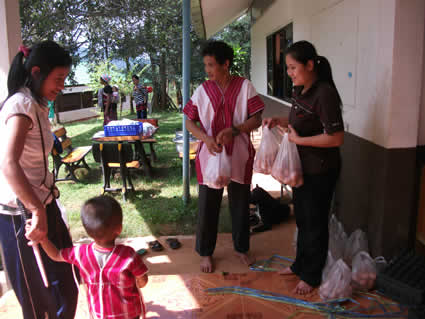The word jai in Thai means “heart,” and it is such an important concept to the Thais that the word can be compounded with more than 100 other words. A few examples:
- Hen jai (see + heart) is the ability to “see into the heart” or “sympathy.”
- Jai dum (heart + black) is “a cruel lack of humanity.”
- Jai boon (heart + merit) means “generous and full of merit.”
- Sabai jai (wellness + heart) means “easy going” or “comfortable.”
- Kao jai (enter + heart) means “understanding.”
The term nam jai (water + heart) means “water from the heart” and is used to describe genuine acts of kindness. It implies that these acts of kindness are done without any expectations — with no strings attached.
When someone brings food to the office to share with everyone else, or when a stranger stops to help when your car stalls — that’s nam jai. When your neighbor helps you fix a leaky faucet, or when a local takes you to your destination rather than just giving you directions, that’s nam jai.

Nam jai is grace. It’s unmerited favor. It’s a gift that doesn’t have to be, and cannot be, repaid. It’s what all Christians are called to show to those around them. We should be looking for opportunities to practice nam jai everywhere we go and with everyone we meet. Think of the difference it would make in this world if we did!
Jesus set the example for us. He practiced nam jai throughout His ministry. From healing the sick to raising the dead to allowing the little ones to come to Him, His life here on earth was a constant “pouring of water from the heart.”
He showed us nam jai in life but even more in death. Remember when one of the soldiers pierced Jesus’ side with a spear? It brought “a sudden flow of blood and water” from Jesus’ heart. The ultimate Nam Jai.
This post was originally published in February 2008 on Michael’s personal blog, Build Your Walls! Guard Your Gates!







3 Comments |Add a comment
I think it is one of the most beautiful words ever constructed. 🙂
Great! You are Thais now.
Yes. That’s grace, desperately needed, yet undeserved favor.
Jesus repeatedly instructs His followers to look out for the needs of the needy, the widows and orphans, and to personally address those needs.
Nam (water) gives life, and when it’s from the jai (heart), God’s rak (love) is shown.
Question: Is the photo from a Karen village?